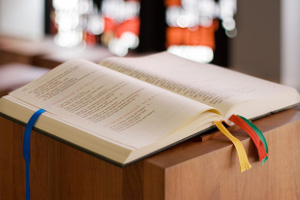 With this parable Luke’s tirade against wealth continues.
With this parable Luke’s tirade against wealth continues.
In verse 9 wealth (mamonas in Greek) itself is called ‘dishonest’ or more literal ‘unrighteous’ (adikias). Surprisingly the ‘unrighteous’ manager is commended (8) as an example of how to be ‘faithful’ (pistos) with ‘unrighteous riches’.
Of course the dishonesty of the manager is one in which he steals from the rich to give to the poor. However unrighteous stealing is; this is a faithful thing to do with money that is unrighteous just by being money. In this matter the ‘children of light’ should learn from the ‘children of this age’.
If we would interpret the parable as an allegory and say that the ‘rich man’ of the parable is God. Then God commends us if we squander God’s wealth by freeing people of the debts they owe God. If we would interpret the parable more loosely and freely into our own context then it becomes clear that if we serve God rather than ‘wealth’ we do not need to keep the laws that private property and the free market burden us with. Serving God precludes being devoted to money and all its trappings.
How can we serve God by being dishonest and faithful at the same time? How can we relieve and release debts? How can we steal from the poor to give to the rich?
18 September 2016
Luke 16: 1-13
This weekly blog on one of the lectionary readings is by Anne Claar Thomasson-Rosingh, Programme Leader for Lifelong Learning at Sarum College.

Leave a Reply